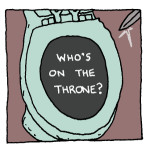Sat 10 Aug 2013
A Game of Thrones: A Fantasy Without A Fantasy
Posted by laup under 2 Stars of the Magi, Abundant, Interesting, Meditations, Review, The Book Mine, Transmutation
Comments Off on A Game of Thrones: A Fantasy Without A Fantasy
 I’ve been sitting on the dumper with this one for a while. Now that the TV series has effectively broken the book series out of the echo chamber and into the mainstream, I figured now is a good time to examine what’s going on with this story.
I’ve been sitting on the dumper with this one for a while. Now that the TV series has effectively broken the book series out of the echo chamber and into the mainstream, I figured now is a good time to examine what’s going on with this story.
If you don’t know what Game of Thrones is, all you need to know is that it’s a story about rich people in medieval times raping, torturing and killing their servants and each other over who gets to sit on the Iron Toilet and call themselves King of the Dumpers. The twist is that none of them know they can’t win until the author gets tired of writing thousand page bestsellers.
The story has two things going for it which I think are noteworthy and worth remarking about.
First, it’s a limited information campaign. Messages, news, and rumor travel slowly if at all. Often when people hear that so-and-so attacked what’s-his-name’s castle with a mallet, so-and-so has already killed what’s-his-name and eaten all the chicken tenders in the winter stores.
But it goes further. Intelligence gathering is primitive and unreliable. People misjudge, jump to (often wrong) conclusions, and make dangerous decisions without knowing crucial information. For example, who-is-he-again assumes all assassination attempts against him are from the same some-dude-he-hates because he heard somewhere-or-other that some-dude-he-hates doesn’t like him either.
It makes for a compelling read because one can’t help but share the character-of-the-moment’s bias. Then in the next chapter you get a whole different perspective and start to wonder what the truth really is. It’s a nice trick, giving the reader an omniscient observation based on clueless people.
The second thing the story has going for it is the immersive identity politics of the rich families. They all have memorable catch phrases, distinct recognizable qualities, and totemic animals designed to appeal to various consumer self-images.
Because there are multiple points of view, readers can choose which side of the power fantasy they want to explore and root for. Go Ice Weasels! Show those nasty Toe Jammers who’s the boss.
This appeals to the very basest urges of nationalism, drawing in our desire to see ourselves in the heroes of our projections. It has an irresistible attraction for anyone who is not acquainted with their own need for spectacle. How can you not try on each noble house, imagining yourself as mindlessly loyal, lusty without consequence, or stinking rich?
Most of the world longs to live like the 1% and have the power to decide one’s own fate.
Except the characters don’t really have any agency. Whenever any of them gets too powerful, the author sneaks in and resets the board. Nobody can win the game on their own merits, no matter who they are.
I have to admit; the books sucked me in at first. A puzzle wrapped in an emotional costume? You can rush from high to low in an instant at every move in the game, letting yourself live in the moment of people who despite being rich and powerful are just pawns of a greater power—the author.
See what a cage the book’s stance is?
2 out of 5 Stars of the Magi.

No Responses to “ A Game of Thrones: A Fantasy Without A Fantasy ”
Sorry, comments for this entry are closed at this time.